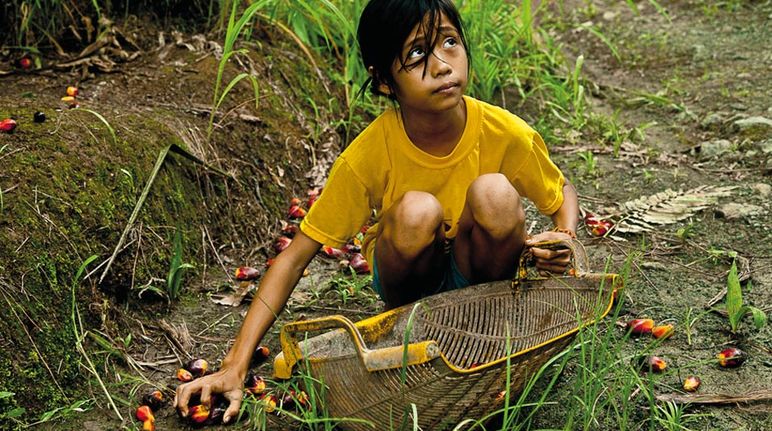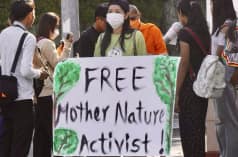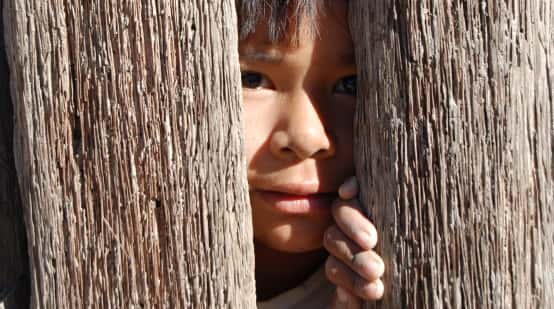Cargill: forced labor is an outrage!
 Plantation labor instead of school: the cruel fate of a little girl (photo: Jason Motlagh / Pulitzer Center on Crisis Reporting) (© Jason Motlagh)
Plantation labor instead of school: the cruel fate of a little girl (photo: Jason Motlagh / Pulitzer Center on Crisis Reporting) (© Jason Motlagh)
Men, women and children endure captivity, public beatings and forced labor in the plantations of the Malaysian KLK Group. Companies like U.S.-based multinational Cargill profit from KLK's cheap palm oil. Call on Cargill to stop trading in palm oil produced on former rainforest land under inhumane working conditions.
Call to actionThey are forced into the toughest and most dangerous jobs, held captive, beaten, and cheated of their wages: men, women and children toiling seven days a week in virtual slavery.
Journalist Benjamin Skinner and his team devoted nine months to studying working conditions on oil palm plantations in Indonesia. Bloomberg Businessweek has now published their shocking findings: workers on the Malaysian KLK Group’s monocultures were lured by false promises, deprived of their personal documents and commandeered into forced labor.
Already in 2010, the environmental NGO Rainforest Action Network (RAN) accused the KLK group and its customers of grave human-rights violations. With 200,000 hectares of plantations, KLK is the fifth-largest palm oil producer in the world. Western corporations such as Cargill are among its customers. Cargill alone reportedly sourced 27,000 tons of palm oil from KLK.
The U.S.-based multinational then supplies the imported oil to major food manufacturers such as Nestlé, Kellogg’s and Unilever, and to the biodiesel industry. The products of slave labor are thus making their way onto our dinner tables and into our fuel tanks in the form of margarine, cereals, chocolate spread and biodiesel.
Rainforest Rescue and RAN are calling on Cargill and its customers to stop trading in the palm oil that is so detrimental to people and the environment.
BackgroundAll of the above companies claim to take their environmental and social responsibilities seriously and display the RSPO seal on their product packaging. Yet the “sustainability seal” of the Roundtable on Sustainable Palm Oil (RSPO) does nothing to counter deforestation or human rights violations – as an industry label, it is mere greenwashing.
The Malaysian Kuala Lumpur Kepong (KLK) group has been a member of the Swiss palm oil association since 2004 and has certified half (88,000 hectares) of its plantations. KLK currently manages nearly 200,000 hectares in Indonesia and Malaysia.
The group has also been in the news for its slash-and-burn clearance of rainforest land for oil palm plantations. The Indonesian National Police is pressing charges against a KLK subsidiary for allegedly burning Sumatran rainforests. In June, choking smoke from the forest fires darkened the skies in parts of Southeast Asia for days.
Cargill, a U.S. multinational, is the world’s largest trader and processor of agricultural products. The family-owned group operates worldwide and is one of the largest companies in the United States, with annual sales of $133 billion. Cargill trades in large quantities of palm oil and has its own plantations and mills in Indonesia.
The group has numerous subsidiaries in Germany, Austria and Switzerland. Cargill Germany GmbH alone has 13 offices and production facilities throughout the country.
We can do our part as consumers, as “Adam”, one of KLK’s forced laborers, notes. Any time we go to a store and pick up a product that contains palm oil, we should ask ourselves whether it was produced by slave labor.
For more information on forced labor at KLK and the responsibility of palm oil traders such as Cargill:
- the Rainforest Action Network (RAN) website on KLK and Cargill
- the Bloomberg Businessweek article and extensive reporting and photos on the Schuster Institute website on the investigation of slave labor in the palm oil industry in Indonesia
- The Atlantic article on child labor for palm oil in Malaysia
To: President and CEO of Cargill, CC: Kellogg’s, Nestlé, Unilever
Dear Mr. Gregory Page, dear Cargill customers,
I will not stand for products of child and slave labor on my dinner table or in my car's fuel tank.
In an article published on July 18, Bloomberg Businessweek published an article on Kuala Lumpur Kepong (KLK) – a Cargill palm oil supplier – highlighting KLK’s grave abuses of the rights of its workers, some of whom are children. In it, KLK workers describe being defrauded, abused and held captive. Many had their identity cards and school records confiscated to prevent them from escaping. Others who tried to escape were beaten publicly.
Cargill’s defense of KLK’s practices is scandalous.
We call on Cargill to put comprehensive safeguards in place to prevent palm oil from forced and child labor, human rights violations and the destruction of rainforests from entering the food supply.
Please take these allegations very seriously and ensure that your products are not in any way connected with the violation of human and labor rights or deforestation. As a consumer, I expect you and your customers to respect human rights and the environment.
Sincerely,
The issue – rainforest on our dinner tables and in our fuel tanks
At 66 million tons annually, palm oil is the most commonly produced vegetable oil. Its low world market price and properties that lend themselves to processed foods have led the food industry to use it in half of all supermarket products. Palm oil can be found in frozen pizzas, biscuits and margarine, as well as body creams, soaps, makeup, candles and detergents.
Few people realize that almost half of the palm oil imported into the EU is used as biofuel. Since 2009, the mandatory blending of biofuels into motor vehicle fuels has been a major cause of deforestation.
Oil palm plantations currently cover more than 27 million hectares of the Earth’s surface. Forests and human settlements have been destroyed and replaced by “green deserts” containing virtually no biodiversity on an area the size of New Zealand.
The impact – suffering and death in producer countries, climate havoc
The warm, humid climate of the tropics offers perfect growth conditions for oil palms. Day after day, huge tracts of rainforest in Southeast Asia, Latin America and Africa are being bulldozed or torched to make room for more plantations, releasing vast amounts of carbon into the atmosphere. As a consequence, Indonesia – the world’s largest producer of palm oil – temporarily surpassed the United States in terms of greenhouse gas emissions in 2015. With their CO2 and methane emissions, palm oil-based biofuels actually have three times the climate impact of traditional fossil fuels.
Palm oil is not only bad for the climate: As their forest habitat is cleared, endangered species such as the orangutan, Borneo elephant and Sumatran tiger are being pushed closer to extinction. Smallholders and indigenous people who have inhabited and protected the forest for generations are often brutally driven from their land. In Indonesia, more than 700 land conflicts are related to the palm oil industry. Human rights violations are everyday occurrences, even on supposedly “sustainable” and “organic” plantations.
As consumers, we are largely unaware of these broader issues, yet our daily palm oil consumption also impacts our health: refined palm oil contains large amounts of harmful fatty acid esters that are known to damage DNA and cause cancer.
The solution – a revolution on our dinner tables and in our fuel tanks
Only 70,000 orangutans still roam the forests of Southeast Asia, yet the EU’s biofuels policy is pushing them to the brink of extinction. Every new plantation on Borneo is destroying a further piece of their habitat. Stepping up the pressure on policymakers is a must if we want to save our tree-dwelling kin. Apart from that, however, there is still a lot we can do in day-to-day life.
Follow these simple tips to recognize, avoid and combat palm oil:
- Enjoy a home-cooked meal: Use your imagination: why not try almond-coconut-pear biscuits? Or pizza with potato and rosemary? A meal cooked from fresh ingredients beats processed foods containing palm oil every time. Oils such as sunflower, olive, rapeseed or flaxseed are ideal for cooking and baking.
- Read labels: As of December 2014, labeling regulations in the EU require food products to clearly indicate that they contain palm oil. However, in the case of non-food items such as cosmetics and cleaning products, a wide range of chemical names may still be used to hide the use of palm oil. A quick check of your favorite search engine will turn up palm oil-free alternatives, however.
- Remember that the customer is king: Ask your retailers for palm oil-free products. Write product manufacturers and ask them why they aren’t using domestic oils. Companies can be quite sensitive to issues that give their products a bad name, so inquiring with sales staff and contacting manufacturers can make a real difference. Public pressure and increased awareness of the problem have already prompted some producers to stop using palm oil.
- Sign petitions and write your elected representatives: Online campaigns put pressure on policymakers responsible for biofuels and palm oil imports. Have you already signed all of Rainforest Rescue’s petitions?
- Speak out: Protest marches and creative action on the street raise public and media awareness of the issue, which in turn steps up the pressure on policymakers.
- Leave your car at home: Whenever you can, walk, ride a bicycle or use public transport.
- Be informed and inform others: Big Business and governments would like us to believe that biofuels are good for the climate and that oil palm plantations are sustainable. Spread the word – share this information with your family and friends and encourage them to rethink their consumption habits. It’s in our hands!













 Recent successes
Recent successes